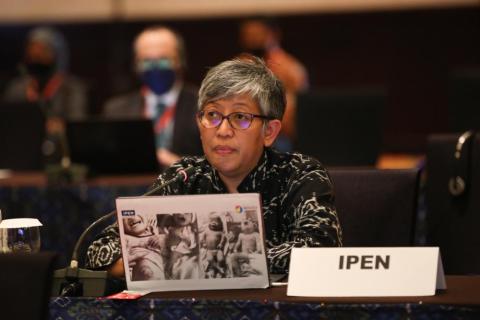Claiming our Right to Live in a Healthy and Toxics-Free Environment

By Yuyun Ismawati
In 2019, during the week of the 78th independence of Indonesia, in mid-August the media covered various stories about the worst air pollution in the capital, Jakarta. The authorities tried to answer the questions with empty promises and mismatched solutions.
I joined the 31 plaintiffs of the Citizen Legal Suits demanding the President of Indonesia, three ministers, and three governors improve Jakarta's air quality. Among the 32 plaintiffs, six mothers joined the lawsuit for their children who suffered from air pollution. I joined the citizen lawsuit in July 2019 for my grandson, who was one year old and has suffered from various respiratory problems since birth.
We won our case at the lower and higher courts. Still, the President insisted on submitting an appeal to the Supreme Court, claiming that there were already policies to address pollution. Today, his administration continues to refuse to do their jobs.
However, air pollution is not the only problem faced by Jakartans. Air, water, and soil pollution have also become a daily issue here and in other Indonesian cities. About 70 million children under 15 in Indonesia are exposed to toxic chemicals and pollution daily. Basic health research statistics show that Indonesian children suffering from non-communicable diseases have increased significantly in the last five years.
The WHO South-East Asia Regional Office (SEARO) noted that health is significantly determined by social, economic, and environmental factors beyond the health sector, such as poverty, education, employment, and physical security. Gender inequality, an important determinant of health, remains a challenge in Indonesia, as elsewhere. Indonesian women lag behind men in many indicators of social well-being, including literacy, share in agricultural holdings, labor force participation and the proportion of doctors.
It continues to be challenging to empower women policy-makers on chemical issues, although promoting and mainstreaming gender programs in every project has been adopted as a standard component. Additionally, although Gender Responsive Budget and Planning and Gender Equality and Social Inclusion (GESI) have been introduced in various development plans, the realisation of the concept is still far from ideal.
In rural and remote villages, mercury use in over eight hundred illegal gold mining sites is rampant in Indonesia, impacting over 20 million at-risk populations, mainly women and children. My organization Nexus3 with the Biodiversity Research Institute found that over 70% of villagers around gold mining sites had mercury levels in their bodies that exceeded WHO safety standards. Further, mercury levels in all environmental matrices tested (soil, aquatic organisms, etc) exceeded Indonesian regulatory levels.
In artisanal and small-scale gold mining (ASGM) sites, women have a 'simple' role, such as selling mercury in stores, keeping it in the bottles under their beds, or pouring it into the ball mills to help their husbands. Even worse, I saw women's role in watching miners or their husbands burn the amalgam in the kitchen without realising the harmful effect of inhaling mercury vapor.
Women are often blamed for their sick children or disabilities in rural and urban areas. We must support and empower mothers and women to have more confidence and knowledge about what's best for their families and children. We must prioritise those impacted by severe pollution from power generation, agriculture, mining, and industrial manufacturing activities. By increasing the knowledge about harmful chemicals among adolescent girls, women, mothers, and professionals, we will have a better society and can avoid toxic chemicals in our daily activities.
I am pleased to see the growing interest in female students, working mothers, and stay-at-home mothers to learn more about the toxic substances in their daily lives, especially after we released our reports. Simple messaging highlighting specific chemicals in everyday products got their attention the most.
Empowering girls and women to claim our rights to live in a healthy and toxics-free environment is a marathon campaign that will need our stamina, patience, and care about future generations.
Yuyun Ismawati is the co-founder and Senior Advisor of Nexus3 Foundation, Indonesia. She has over 30 years of experience working on environmental health issues. Yuyun holds a bachelor’s degree in environmental engineering from Bandung Institute of Technology and an MSc in Environmental Change and Management from the University of Oxford. She received the Goldman Environmental Prize in 2009 for her work in pollution and waste.
